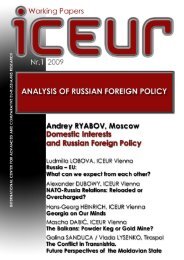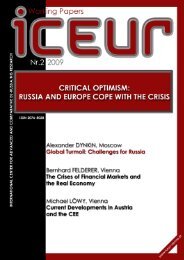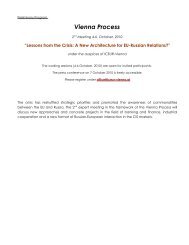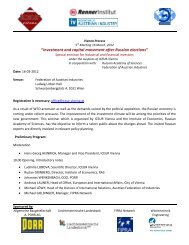EU-Russia: New Departures and Old Habits - ICEUR-Vienna
EU-Russia: New Departures and Old Habits - ICEUR-Vienna
EU-Russia: New Departures and Old Habits - ICEUR-Vienna
You also want an ePaper? Increase the reach of your titles
YUMPU automatically turns print PDFs into web optimized ePapers that Google loves.
Mark ENTIN<br />
The political situation that had arisen at that time was unique because it was in fact possible to achieve<br />
everything in the fields of politics <strong>and</strong> economy. One could have tried to give the international relations a<br />
really new quality, to solve the problems of the historical reconciliation of the former enemies, to come to an<br />
agreement about inclusive guidelines <strong>and</strong> institutions for the joint administration of the common living<br />
space.<br />
But the “air of freedom made them drunk”. The fact that there was no resistance or real opposition against the<br />
plans for primitive expansion blinded them. The deceptive success played an evil game with the political<br />
classes of the West, <strong>and</strong> especially of Western Europe. It appeared to them that their plans to integrate such a<br />
large group of neighbouring countries were absolutely legitimate, literally messianic.<br />
As a result, NATO, <strong>EU</strong> <strong>and</strong> their member states decided to choose the way of extensive development. They<br />
were particularly occupied with themselves, with the celebration of their victory <strong>and</strong> the non-restricted<br />
furious outburst of consumption. By doing so, they themselves fostered the global crisis of 2008-2009 which<br />
has, in a different form, been going on until today.<br />
The world-wide processes were left to self-regulation. The division of the continent into “us” <strong>and</strong> “them”<br />
remained the same, only the division line was moved further East. There were no really new instruments for<br />
the administration of the different parts of the continent <strong>and</strong> the global development. Not even one of the<br />
problems, most of the countries in the world <strong>and</strong> the whole human race is confronted with has been solved.<br />
The list of severe international catastrophes seems to be endless. Let me name just the most critical among<br />
them: the lack of food <strong>and</strong> clean drinking water in many parts of the world, misery, poverty <strong>and</strong> the<br />
indebtedness of many countries <strong>and</strong> whole regions. All this is happening while tens <strong>and</strong> hundreds of billions<br />
of Dollars <strong>and</strong> Euros are being squ<strong>and</strong>ered under the guise of development aid.<br />
The world is being flooded with weapons of mass destruction <strong>and</strong> means of transporting them. Until<br />
recently, it would still have been possible to stop this process by acting quickly <strong>and</strong> resolutely. Alas, this did<br />
not happen. Now it is going to be very difficult, if not impossible, to stop it. This is shown by the discussions<br />
about building global <strong>and</strong> tactical missile defence systems.<br />
Furthermore, international relations are nowadays characterised by real orgies of violence. Acts of<br />
aggression, the use of armed forces, international <strong>and</strong> regional armed conflicts of varying intensity <strong>and</strong><br />
extent have become a quite ordinary phenomenon, whereas a burst of violence is to be expected from every<br />
side. Neither statutory <strong>and</strong> structured nor informal unions of states are able to get grips of this situation at the<br />
moment.<br />
But this is not the only field on which they are being defeated. They are about to lose their wars against many<br />
phenomena: against global financial speculation, the drug business, organised crime, international terrorism<br />
as well as substatal <strong>and</strong> networked radicalism.<br />
Things cannot go on like this. Otherwise the visions of a climatic, ecological, nuclear, military or financial<br />
catastrophe or a catastrophe due to the lack of raw materials <strong>and</strong> food or any other catastrophe, looming on<br />
the horizon, will become reality.<br />
The situation has to be brought under control eventually. The construction of a Greater Europe as a<br />
responsible global player, taking over the leadership in the solution of global problems would be the ideal<br />
way to realise this idea.<br />
The objective requirements are given. They have been existing since the late 1980s, the early 1990s. They<br />
have not been able to make use of them yet <strong>and</strong> it is questionable if they are going to do so now. The<br />
subjective requirements are too vague: positive experiences in the cooperation between <strong>Russia</strong> <strong>and</strong> NATO<br />
as well as <strong>Russia</strong> <strong>and</strong> the <strong>EU</strong> have been very rare so far.<br />
Therefore it is vital to extend those positive experiences <strong>and</strong> to build up the subjective requirements step by<br />
step.<br />
IC<strong>EU</strong>R-<strong>Vienna</strong> Working Papers 3|2010 6









